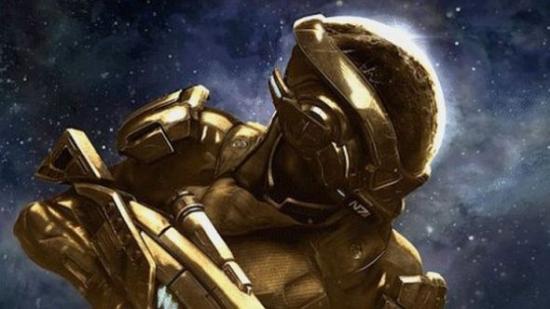Thanks to the recent launch of Mass Effect: Andromeda, there are now even more ways to be wrong when it comes to ranking BioWare’s space opera and dating sim series. The last thing anybody wants is to be ostracised by society for having a criminally misguided opinion.
Read more: the best RPGs on PC.
To help you avoid getting into bar brawls or potentially contributing to the collapse of civilisation, here are all four of the games ranked for your reading pleasure. This is definitive, codified and is Commander Shepard’s favourite list on the Citadel. Spoilers ahead, as you’d expect.
4 – Mass Effect: Andromeda
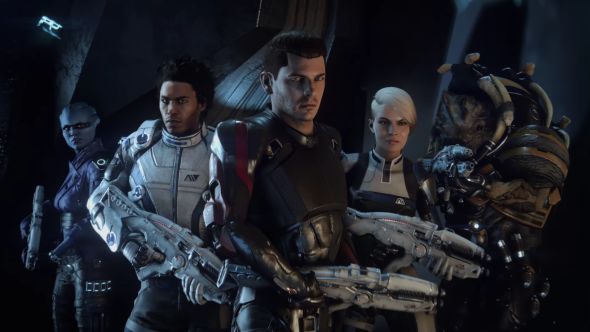
Every new Mass Effect has proved to be a little divisive, but none more so than the latest in the series. Set over six centuries after the first trilogy, in a new galaxy, it has the air of a reboot about it, and it’s absolutely heaving with changes. Not all of them welcome.
Damn it’s ambitious, though. It’s a sprawling game with an overwhelming amount of missions, dialogue and ancillary shenanigans. Each of the main planets is filled to the brim with ruins to explore, aliens to slaughter, aimless settlers to rescue and secrets to uncover. Often, it feels like it’s finally fulfilling the promise of the planetary exploration sections introduced in the first Mass Effect, but instead of traipsing around barren wastelands, you’re wandering around worlds absolutely teeming with life and diversions.
So there’s plenty to do, and it boasts the best combat in the series, sporting an extremely flexible system that doesn’t limit you to a specific class or powerset. But constant niggles threaten the improvements. Abysmal AI, copy-paste missions, frustrating busy-work and an absolutely miserable crafting system only represent a slice of the game’s problems.
The main reason it’s the weakest game in the series, however, is that a lot of what makes Mass Effect so engaging has fallen by the wayside. Dialogue is largely perfunctory, sometimes properly embarrassing; characters are poorly developed and your squad barely plays a role. And the story is easily the most forgettable of all four, crippled by some serious pacing issues and a lack of meaningful choices. It suggests a serious identity crisis, or a horrific case of memory loss, where lessons learned from the three previous games were entirely forgotten and the best parts ignored.
Some of the really interesting new additions are forgotten about rather quickly, too. Colonialism is set up to be a major theme, while setting up outposts is established as this important task, but neither bears fruit. The murky morality of colonialism is pushed off to the side, while outposts barely play a role at all, beyond offering up more side missions. It’s full of stuff like this: fascinating ideas that don’t really go anywhere.
3 – Mass Effect
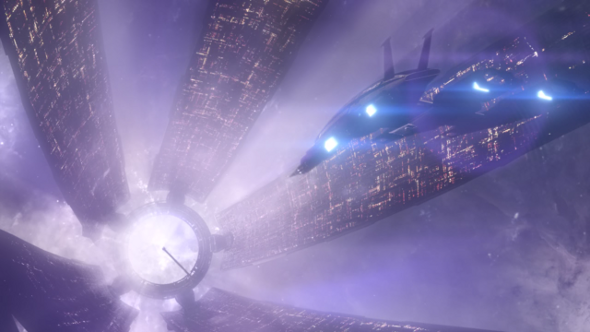
The first Mass Effect is the most difficult to place. Everything that’s great about the later entries is built on the first game’s impressive foundations, and it remains a lesson in RPG world building a decade on. It’s bold, too, reimagining what an RPG can be, notably by introducing squad-based shooter combat and a fully voiced male or female protagonist.
Memorable moments are a dime a dozen. Bullying a Hanar on the Citadel (“Stupid jellyfish”), constantly hanging up on the Council, dabbling in a bit of corporate espionage – it can be funny, emotionally taxing and utterly thrilling. And while the other games often improve what Mass Effect started, it’s aged surprisingly well. Strong writing and a lovable cast help to no end.
Sometimes, though, it’s a bit of a chore. Combat’s a low point, even though it was novel a decade ago, and the level design is uninspired at best, amounting to a lot of storerooms and walkways. The promise of exploring a multitude of alien worlds proves to be rather hollow, too. Sure, you can hop in the Mako and drive about, but each world looks essentially identical, featuring only the occasional boring building or meaningless collectible.
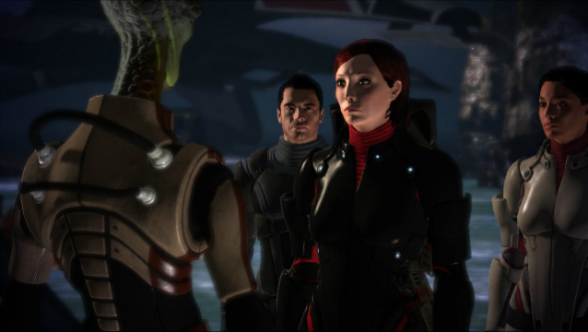
That’s not to say there isn’t any reason to visit these places. A great many of Mass Effect’s gripping side missions are crammed inside dreary warehouses on barren planets, and though the Mako is an absolutely ridiculous vehicle, there’s still fun to be had driving around and defying physics. Plus, it’s got a gun, which puts it far above Andromeda’s Nomad.
Despite the strong writing and a plethora of exceptional side missions, the main story is a mixed bag with some pacing issues that strip away some of the tension from hunting down a rogue Spectre and uncovering a galaxy-shattering plot. A lot of the massive decisions you make as the galaxy’s most indomitable hero aren’t immediately apparent, either. Like Andromeda, it’s setting up a series, and thus holds back a bit.
2 – Mass Effect 3
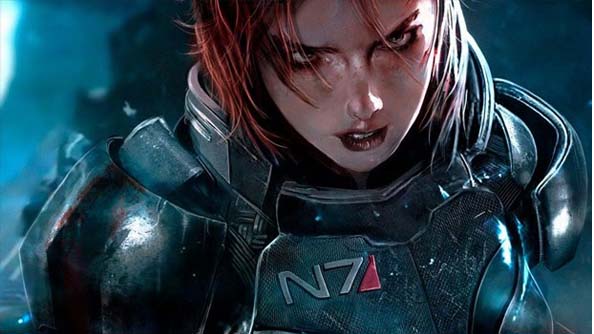
It’s a shame that so much of the conversation surrounding Mass Effect 3 continues to focus on the ending. It’s not great. It’s about 15 minutes of a 40-hour game. It’s time to move on. Especially since the final game in this first trilogy is really, really good. It’s a story about war, the end of the status quo, and the culmination of everything you’ve been working for across multiple games.
Playing Mass Effect 3 is a deeply personal experience. It is, in great part, crafted out of the choices you make in the in its predecessors. Almost everyone that you know might already be dead thanks to your decisions and actions. This is where you finally deal with the consequences of everything you’ve done. It is absurdly ambitious and elaborate in a multitude of ways, both subtle and gargantuan.
Despite its bombastic battles – of which there are many, all greatly improved over its predecessors – it’s the quiet moments that make the game so compelling. By this point, Shepard is as nuanced and complex as any scripted character, and you can really see the impact their trials and tribulations have had on them. Both Mark Meer and Jennifer Hale excel themselves, bringing the character to life in conjunction with us, the players. Brief asides and chats prove to be just as evocative as speeches and in-depth discussions.
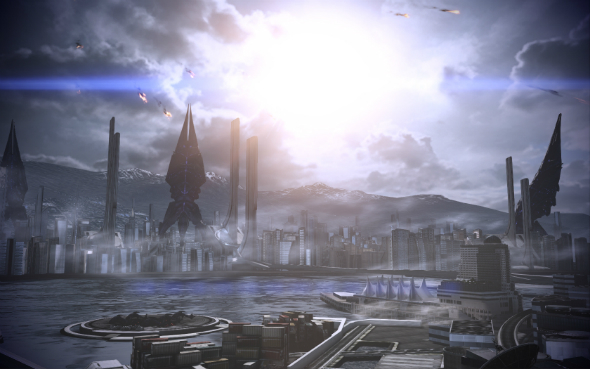
Mass Effect 3 does occasionally stumble, however. The abstract elements of the war, “war assets”, are particularly frustrating. You need a certain amount of them to get the best ending, and to get there you must either grind through a lot of tedious side missions for hours and hours or engage with the multiplayer modes that don’t quite fit comfortably into what is a single-player game. Also, Cyborg Ninja Boy is a terrible villain. Into the sea with him.
Aside from the last moments – which aren’t even close to the worst RPG ending – Mass Effect 3 feels like a fitting end to the series. It’s bittersweet, as so many finales are, but largely does justice to Shepard’s saga. And for goodness’ sake, whatever you do, don’t forget to play the Citadel DLC.
1 – Mass Effect 2
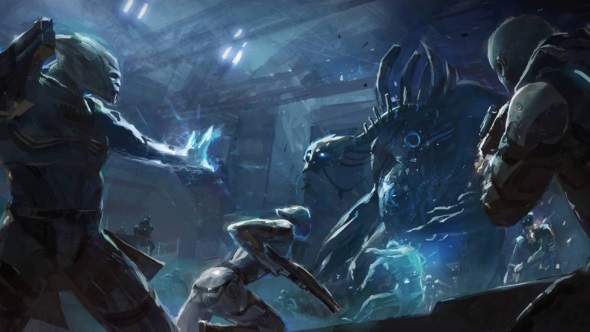
Here it is. The Daddy. The Big One. There’s a pretty valid argument that BioWare really peaked with Mass Effect 2, though there’s another argument that suggests it’s where the studio bid farewell to a lot of genre conventions, leaving their games feeling a little less like RPGs and more like chatty shooters. Either way, gosh it’s great.
Mass Effect 2’s opening moments really set the tone. The beloved Normandy being utterly destroyed, the Alliance crew being murdered. And there’s Shep, trying to save the day again, trying to rescue everyone and dying in the process. It’s a fantastic set piece in a game that’s full of them, a statement of intent that screams, “Shit is going to get crazy”.
And crazy it does indeed get, culminating in a climactic suicide mission where everyone might die. We’re not talking about smoke and mirrors and the illusion of choice here, either. This isn’t the Ashley/Kaidan conundrum. You can save everyone. You can be the improbable hero. But to do that, you need the trust of your squad, you need to make all the right calls, and you need to be decisive. And if you do lose people, it’s not down to some arbitrary false choice – it’s because you cocked up. The threat of losing even one chum is horrific after spending so much time with them; potentially losing them all is an almost unbearable risk.
At the centre of what makes this sequel the greatest of the bunch is – okay, we’re going to get a bit sentimental here – its heart. The first game establishes this huge, complex galaxy and really focuses on fleshing it out, but Mass Effect 2 turns it into a stage for a much more affecting, emotional yarn. The relationships between Shepard and their crew, ultimately, make the difference between life and death. Friendships and romances drive the game, along with the themes of family and legacy, and while player actions can help a character grow, the crew also helps inform how Shepard evolves.
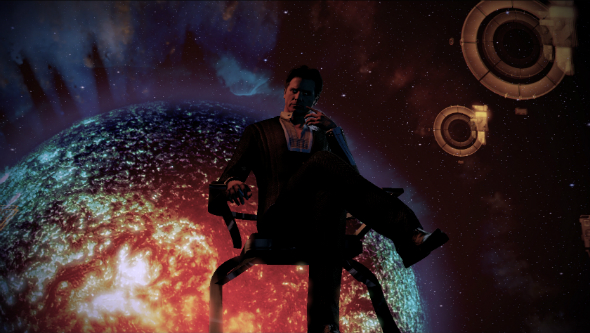
Loyalty missions are where these relationships are tested and strengthened. Each crew member has a personal mission that they want to finish before they risk their life, and they stand out as some of the greatest quests BioWare have ever crafted, full of difficult choices and impactful drama. And the weight of the impending suicide mission always hovers over them. This might be the last chance they have to right wrongs.
Mass Effect 2 is also blessed with the best villain in the series. It’s not the Collectors, with their plot to make a completely ridiculous giant Terminator, or their intimidating boss, Harbinger. It’s the Illusive Man. Or is it? Throughout the game there’s this sense that you’re not getting the full picture. Are you working for Cerberus, using Cerberus, or are you just a puppet? And do any of these questions actually matter, as long as you save the day?
So there you have it: each Mass Effect ranked. No more bickering, please.
